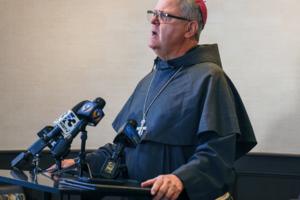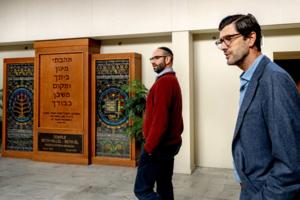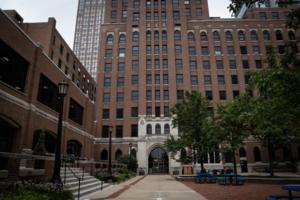Religion
/Health

Oakland Diocese proposes new $242 million sex abuse scandal settlement
OAKLAND, Calif. — The Roman Catholic Diocese of Oakland proposed a new $242 million settlement with hundreds of parishioners who claim they were sexually abused for years at the hands of local clergy, a plan that drew immediate pushback from the victims’ attorneys, who say it doesn’t go far enough.
The proposal, filed Thursday in U.S. ...Read more
Leaders of secretive California religious group accused of murder after members vanish
LOS ANGELES — Two leaders of a group described as “cult-like” by authorities in Southern California's Inland Empire region have been arrested along with a prominent member on suspicion of murder amid multiple investigations into the disappearance of two former members and the death of a 4-year-old boy many years ago.
Darryl Muzic Martin, ...Read more

Norfolk mosque vandalized with black crosses painted on building
NORFOLK, Va. — The Masjid Ash-Shura mosque on Colley Avenue in Norfolk was vandalized between Sunday night and Monday morning with a series of black crosses spray-painted along the side of the building, but a group of volunteers quickly came together to help clean it off.
Police are in possession of a video that shows one man, at some point ...Read more

Pope Leo XIV delivers peace message to 150,000 at Beirut Mass
BEIRUT — With a rainbow adorning the early morning sky, tens of thousands converged on Beirut's waterfront on Tuesday to attend public prayers led by Pope Leo XIV — the culmination of an international debut that saw the U.S.-born pontiff repeatedly call for peace in a time of increasing war.
Addressing a crowd of an estimated 150,000 people...Read more
Minnesota faith leaders are raising the alarm on cuts to housing programs
Faith leaders will join lawmakers and housing advocates for a 12-hour vigil on Tuesday at the Basilica of St. Mary in Minneapolis to protest recent cuts from the U.S Department of Housing and Urban Development.
The “Losing Sleep, Losing Homes” vigil is urging HUD officials to reconsider their decision. The event starts at noon with speakers...Read more

Sen. Klobuchar meets Pope Leo at the Vatican with Ukrainian delegation
Minnesota Sen. Amy Klobuchar met with Pope Leo XIV on Friday at the Vatican as part of a delegation visit from Ukraine that’s asking the church to help return more than 19,000 children who have been abducted during the ongoing war with Russia.
Klobuchar said she spoke with the first American pope for 20 minutes. They talked about the missing ...Read more

Charlotte bishop tells pope of Border Patrol raids, urges compassion for immigrants
CHARLOTTE, N.C. — As Border Patrol agents fan out of Charlotte and fear lingers from days of federal immigration enforcement across the region, Bishop Michael Martin is urging Catholics to confront the moment through the lens of faith, not politics.
Half of the diocese’s roughly 565,000 Catholics are Hispanic. Many stayed home from Mass, ...Read more
KC Catholic Diocese covered up sexual abuse by priest for decades, lawsuit says
A lawsuit filed against the Catholic Diocese of Kansas City-St. Joseph Tuesday claims the church covered up sexual abuse the plaintiff allegedly experienced as a child at the hands of a priest around 50 years ago.
The lawsuit marks one of several in recent years against the diocese alleging sexual abuse was concealed by the church, and marks ...Read more
NC progressive faith leaders denounce Border Patrol actions in Triangle, Charlotte
A coalition of North Carolina faith leaders representing more than a dozen denominations denounced U.S. Border Patrol operations across the Triangle and in Charlotte during a virtual conference Thursday.
“We believe the presence of federal immigration law enforcement in our state prompts us to speak out this morning, declaring the values of ...Read more

Gov. JB Pritzker meets pope in Rome, discussing Trump's Chicago immigration crackdown
Illinois Gov. JB Pritzker and first lady MK Pritzker met with Pope Leo XIV in Rome on Wednesday, where they discussed the Trump administration’s immigration crackdown and the two formally invited the pope to visit Chicago, the governor’s office said.
“It was an honor for MK and me to meet with @Pontifex — a son of Illinois — to ...Read more

Brooklyn church celebrates 170 years of faith, community and resilience
NEW YORK — After enduring fire, flood, recession, a pandemic and changing times, a Brooklyn church still stands to celebrate its 170th anniversary on Sunday.
Much as visitors to Red Hook experience today, the Visitation of the Blessed Virgin Mary’s clock tower was among the first sights immigrants spotted arriving in New York Harbor, said ...Read more

Trump's border adviser blasts US Catholic bishops over criticism of immigration raids
White House border adviser Tom Homan lambasted the Catholic Church on Friday over its stance against the Trump administration's mass deportations.
"The Catholic Church is wrong, I'm sorry," Homan told reporters outside the White House. "I'm saying it not only as the border czar, I'm saying it as a Catholic."
Homan described himself as a "...Read more
In honor of a patron saint, Catholic groups pray, protest outside Miami immigration court
MIAMI — One day every year, Catholics around the world honor Saint Frances Cabrini, the patron saint of immigrants who spent much of her life working with marginalized Italians flocking to the United States in the early 1900s.
That day, Nov. 13, was Thursday and in Miami, faith leaders and advocates for immigrants used the celebration of ...Read more

US Catholic bishops take stand against Trump immigration tactics, winning praise at churches
LOS ANGELES — For the first time in 12 years, U.S. Catholic bishops have issued a unified statement to support the country's immigrants and oppose the Trump administration's "indiscriminate mass deportations of people."
The move marked a voice of support for immigrants — long a vital part of the U.S. Catholic Church — amid a year of ...Read more

US Catholic bishops oppose Trump's 'indiscriminate' deportations in a rare statement
LOS ANGELES — For the first time in 12 years, U.S. Catholic bishops issued a unified statement Wednesday to support the country's immigrants and oppose the Trump administration's "indiscriminate mass deportations of people."
The special statement was issued during the bishops' annual gathering in Baltimore. It was the first time since 2013 ...Read more

A Pennsylvania synagogue opened its doors to a local church. A 'deeply profound' partnership ensued
PHILADELPHIA — Rabbi Ethan Witkovsky and Reverend Adam Hearlson seem like they've been friends forever.
Witkovsky, 41, is the senior rabbi at Temple Beth Hillel-Beth El (TBH-BE), a Conservative movement synagogue in Wynnewood, Pennsylvania. Hearlson, 44, is the pastor at Overbrook Presbyterian Church (OPC), in Philadelphia.
Sitting in the ...Read more

Moody Bible Institute sues Chicago Public Schools for religious discrimination
CHICAGO — Moody Bible Institute is suing the Chicago Board of Education for alleged religious discrimination after the college was barred from the district’s student teaching program.
The Christian college alleges Chicago Public Schools will not allow it to participate in the program unless it signs the district’s non-discrimination ...Read more

Pope Leo speaks out on reports of ICE refusing Communion for detained immigrants
Pope Leo XIV urged U.S. Immigration and Customs Enforcement to respect the spiritual rights of individuals in ICE detention after Catholic clergy members said they were prohibited from giving Communion to immigrants at a Chicago-area facility.
On Nov. 1, ICE officials refused to let a group of clergy members led by Bishop José María Garcia-...Read more

Miami's top Catholic leader, 75, to file retirement papers. Here's what happens next
MIAMI — Miami’s top Catholic leader Archbishop Thomas Wenski, who turned 75 this month, will be submitting a retirement letter to the Vatican.
But that doesn’t mean he plans to go anywhere — at least just yet.
Sending the letter of intent to retire is “regular protocol” for all Catholic bishops and archbishops when they turn 75, ...Read more

Federal judge agrees to dismiss bankruptcy case filed by Oakland Catholic Diocese
A federal bankruptcy judge Thursday granted a request by the Roman Catholic Diocese of Oakland to dismiss its bankruptcy case, setting the stage for hundreds of sexual assault victims to take their long-running lawsuits against the church to trial in the coming months and years.
Judge William J. Lafferty said his decision would not be official ...Read more
Popular Stories
- Leaders of secretive California religious group accused of murder after members vanish
- Oakland Diocese proposes new $242 million sex abuse scandal settlement
- Norfolk mosque vandalized with black crosses painted on building
- Pope Leo XIV delivers peace message to 150,000 at Beirut Mass
- In honor of a patron saint, Catholic groups pray, protest outside Miami immigration court







